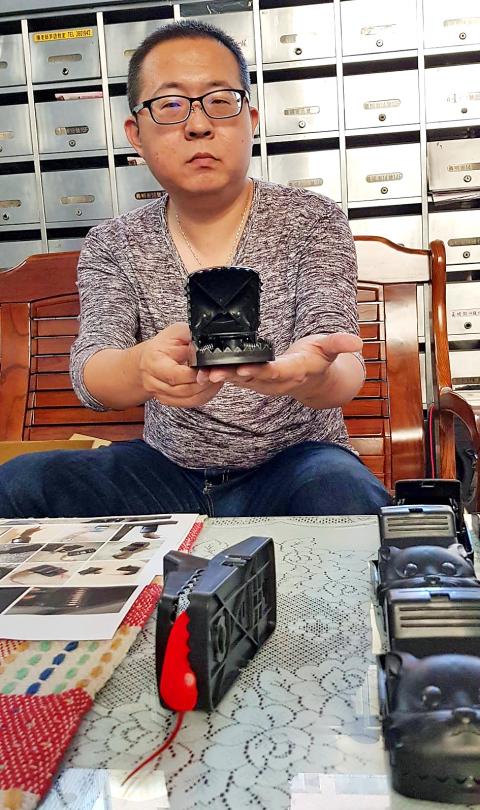The Animal Rescue Team Taiwan yesterday urged authorities to investigate a plastic animal trap that has become popular online, after the organization received reports from animal lovers.
People are aware that the use of traditional, metal animal traps has been prohibited, Animal Rescue Team spokesperson Anthony Ni (倪京台) said.
However, the organization has received reports about a plastic trap, dubbed a “modified animal trap,” claiming to be a new, “third-generation” product with a “200 percent capture rate” that can kill mice instantly, Ni said.

Photo: Chen Wen-chan, Taipei Times
The traps can be found on major online retail Web sites and are being sold for NT$39 each, he said, adding that a seller was offering a buy-three-get-one-free deal.
The seller included more than 10 photographs and videos demonstrating how the trap works, he said.
The trap is incredibly powerful and could break a child’s fingers if they get them caught in it, Ni said.
Animal traps, as defined in Article 2-1 of the Enforcement Rules of Animal Protection (動物保護法施行細則), are “devices designed to catch and restrain an animal by using strong spring operated [jaws] either with or without a serrated edge or teeth” — regardless of construction material or product name, he said, citing a Council of Agriculture statement.
Although “modified animal traps” on the market are not made of metal and are being called things like “magical mouse-capturing device,” the regulations define them as traps, Ni said.
Offenders could be fined between NT$15,000 and NT$75,000 for the unauthorized production, sale, display, import or export of animal traps under the Animal Protection Act (動物保護法), he said.

Taiwanese can file complaints with the Tourism Administration to report travel agencies if their activities caused termination of a person’s citizenship, Mainland Affairs Council Minister Chiu Chui-cheng (邱垂正) said yesterday, after a podcaster highlighted a case in which a person’s citizenship was canceled for receiving a single-use Chinese passport to enter Russia. The council is aware of incidents in which people who signed up through Chinese travel agencies for tours of Russia were told they could obtain Russian visas and fast-track border clearance, Chiu told reporters on the sidelines of an event in Taipei. However, the travel agencies actually applied

Japanese footwear brand Onitsuka Tiger today issued a public apology and said it has suspended an employee amid allegations that the staff member discriminated against a Vietnamese customer at its Taipei 101 store. Posting on the social media platform Threads yesterday, a user said that an employee at the store said that “those shoes are very expensive” when her friend, who is a migrant worker from Vietnam, asked for assistance. The employee then ignored her until she asked again, to which she replied: "We don't have a size 37." The post had amassed nearly 26,000 likes and 916 comments as of this

New measures aimed at making Taiwan more attractive to foreign professionals came into effect this month, the National Development Council said yesterday. Among the changes, international students at Taiwanese universities would be able to work in Taiwan without a work permit in the two years after they graduate, explainer materials provided by the council said. In addition, foreign nationals who graduated from one of the world’s top 200 universities within the past five years can also apply for a two-year open work permit. Previously, those graduates would have needed to apply for a work permit using point-based criteria or have a Taiwanese company

The Shilin District Prosecutors’ Office yesterday indicted two Taiwanese and issued a wanted notice for Pete Liu (劉作虎), founder of Shenzhen-based smartphone manufacturer OnePlus Technology Co (萬普拉斯科技), for allegedly contravening the Act Governing Relations Between the People of the Taiwan Area and the Mainland Area (臺灣地區與大陸地區人民關係條例) by poaching 70 engineers in Taiwan. Liu allegedly traveled to Taiwan at the end of 2014 and met with a Taiwanese man surnamed Lin (林) to discuss establishing a mobile software research and development (R&D) team in Taiwan, prosecutors said. Without approval from the government, Lin, following Liu’s instructions, recruited more than 70 software